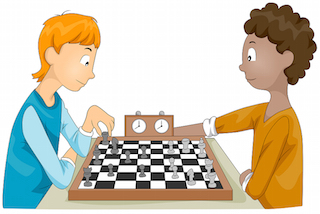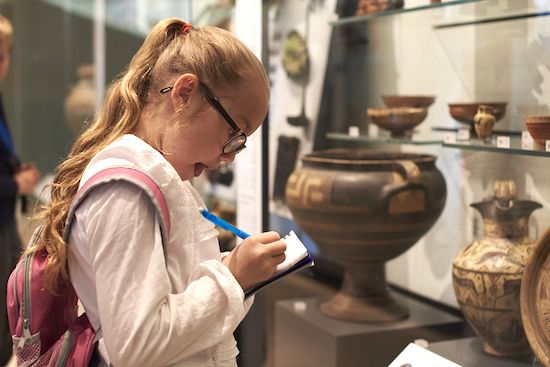School Leadership 2.0
A Network Connecting School Leaders From Around The Globe
Refreshing Advice for New History Teachers
Refreshing Advice for New History Teachers
BY LAUREN S. BROWN · PUBLISHED 06/10/2018
A MiddleWeb Blog
 In between my first eight years of teaching and my return to the classroom, I taught pre-service educators in social studies.
In between my first eight years of teaching and my return to the classroom, I taught pre-service educators in social studies.
What follows in italics is a final list of advice I gave these soon-to-be history teachers at the end of the semester. Below each piece of advice are my reflections based on my last three years in the classroom as a middle school teacher.
- There is a world of difference between being “cool” and being a “cool teacher.” Be “cool” on your time. Be the “cool teacher” at school.
This one came partly from my experience with a student teacher I was supervising who got into trouble. He was swearing—regularly—in class with students. I’m sure that some of his students thought that made him cool. But at least one of them didn’t, because she reported it to the principal and that student teacher was dismissed from the program.
The other problem I recognize now that I am older is this: relying on one’s youth is not sustainable. First, it is superficial. But more important, it is fleeting. Connect with them because you care about them as individuals. Connect with them as a mentor, as an older and wiser adult in their lives—even if you’re only a decade older.
- Get to know your students. Have a sense of humor. Remember that even the kids who annoy you the most have parents who love them and think they are the greatest – or other teachers who see a side of them that you do not. Even the kids who are failing your class are good at something. Remember that, like you, they have lives outside of the classroom and things that get in the way of school.
A few years ago I had a student who did little in class. She struggled to pay attention, rarely completed homework and didn’t seem to study for tests or quizzes. But boy, could she sing!
 I now make it a point to attend games and competitions and performances of my students whenever possible. When I see students after a performance or a win or defeat at a game, they are thrilled that I was there. They know I care about them. They know that I know that they can run, dribble, shoot, hit, sing, act, dance, play chess.
I now make it a point to attend games and competitions and performances of my students whenever possible. When I see students after a performance or a win or defeat at a game, they are thrilled that I was there. They know I care about them. They know that I know that they can run, dribble, shoot, hit, sing, act, dance, play chess.
And I find this makes them try harder in class. Knowing that in addition to responding to an assignment on the causes of the Civil War, a student might have a band performance, or problems at home or in their personal life, helps me acknowledge that they are people and not just students.
- Your reason for teaching something should never just be because it is what comes next in the book. Even very good textbooks are flawed and should never be the guiding force in planning. Your lesson will be better if you can answer the question, why do we need to know this? And you ought to believe in your own answer.
One of my biggest pet peeves is when a teacher names a unit by a number. I asked a student teacher once about where a particular lesson fit in, and her answer was, “We are on Unit 5.” This told me absolutely nothing. What is unit 5?! A unit should be about something – something your lesson entails.
Similarly, don’t just teach a topic because it is in the textbook. By design, textbooks tend to cover just about everything, though superficially. Just because the textbook mentions something doesn’t mean you need a whole lesson on it. You only have 170 (give or take a few) days of teaching. You cannot cover everything. Cover the parts that matter. And the things that the textbook leaves out are often some of the things that matter most.
- Students should have at least a few primary sources to grapple with throughout a unit. Otherwise, they are just reading abouthistory instead of drawing their own conclusions. Ideally, every day in your class, students should be doing some reading, some writing, and much thinking. Ask yourself often whether or not that is happening.
I still need this reminder. Every unit? I got that covered. Every day? That’s tougher. One of my summer projects is to go through each lesson (yes, I do this every summer) and look for places where I can make students do more of the heavy lifting.
- Make use of the arts—music, literature, art, poetry. All the social sciences study how humans live. And humans do not live without the arts.
There is not a history lesson that can’t be enlivened with a little music or a poem to start things off – or an intriguing image to bring the past alive. Adding these things will enrich your lessons and help students better appreciate the song, painting, poem or novel because they will understand the historic circumstances that created it.
- You should teach things that are controversial often, because the social sciences are controversial. If there is no controversy, you are probably teaching things too superficially.
One of the things I have come to appreciate about middle school students is that they really want their voices heard and to be taken seriously by adults. They want their teachers to ask them challenging questions (even as they complain about having to work so hard), and they want to offer their opinions.
- History is full of drama, both comedic and tragic. Teach your students about battles won and lost. Teach them about the victories, the heroic, about what is possible. And teach them about opportunities lost, injustice and disasters. And in between, you can tell them good stories. There are plenty of good stories.
 https://www.middleweb.com/wp-content/uploads/2018/06/lb-explore-more-gr-bd-320-300x235.jpg 300w" sizes="(max-width: 320px) 100vw, 320px" />As a beginning teacher, whenever I was stuck about what to teach my students the next day, my mentor would say, “Tell them a story.” It exasperated me because I didn’t know many stories. But he was right. My knowledge of history is much greater now, and I know a lot of stories. I am constantly learning new ones. My students love them. They love them because I love them.
https://www.middleweb.com/wp-content/uploads/2018/06/lb-explore-more-gr-bd-320-300x235.jpg 300w" sizes="(max-width: 320px) 100vw, 320px" />As a beginning teacher, whenever I was stuck about what to teach my students the next day, my mentor would say, “Tell them a story.” It exasperated me because I didn’t know many stories. But he was right. My knowledge of history is much greater now, and I know a lot of stories. I am constantly learning new ones. My students love them. They love them because I love them.
Whether it’s the one about young Theodore locking his future wife Edith in the closet as Abraham Lincoln’s funeral procession passed, or that Secretary of War Henry L. Stimson might have taken Kyoto off the list of consideration for cities on which to drop the atomic bomb because he had been there on his honeymoon, intriguing stories bring the past to life.
- If you do not find a historical subject interesting, neither will your students. And if you don’t find it interesting, it is probably because you don’t know enough about it. Read. Read a lot. The more you read about your subject, the better your teaching will be.
As Abraham Lincoln said, you can fool some of the people all of the time, and all of the people some of the time, but you cannot fool all of the people all of the time. There is no website, no book, no blog that can substitute for true knowledge about your subject.
This is the hardest tip of all. It is hard because it points out that there are few shortcuts to good teaching. There isn’t some sure-fire method that one can quickly apply to a topic in history, because first you have to know the history.
There are certain topics I used to dread teaching because I really didn’t know that much about them. Certainly, there are still some topics and eras that I prefer over others. But at this point in my career, I can honestly say that my favorite unit is whatever unit I am on. It took me a long time to get there. Not every lesson is my favorite. But maybe one day. . . .
JOIN SL 2.0
SUBSCRIBE TO
SCHOOL LEADERSHIP 2.0
Feedspot named School Leadership 2.0 one of the "Top 25 Educational Leadership Blogs"
"School Leadership 2.0 is the premier virtual learning community for school leaders from around the globe."
---------------------------
Our community is a subscription-based paid service ($19.95/year or only $1.99 per month for a trial membership) that will provide school leaders with outstanding resources. Learn more about membership to this service by clicking one of our links below.
Click HERE to subscribe as an individual.
Click HERE to learn about group membership (i.e., association, leadership teams)
__________________
CREATE AN EMPLOYER PROFILE AND GET JOB ALERTS AT
SCHOOLLEADERSHIPJOBS.COM
New Partnership
Mentors.net - a Professional Development Resource
Mentors.net was founded in 1995 as a professional development resource for school administrators leading new teacher induction programs. It soon evolved into a destination where both new and student teachers could reflect on their teaching experiences. Now, nearly thirty years later, Mentors.net has taken on a new direction—serving as a platform for beginning teachers, preservice educators, and
other professionals to share their insights and experiences from the early years of teaching, with a focus on integrating artificial intelligence. We invite you to contribute by sharing your experiences in the form of a journal article, story, reflection, or timely tips, especially on how you incorporate AI into your teaching
practice. Submissions may range from a 500-word personal reflection to a 2,000-word article with formal citations.

You need to be a member of School Leadership 2.0 to add comments!
Join School Leadership 2.0